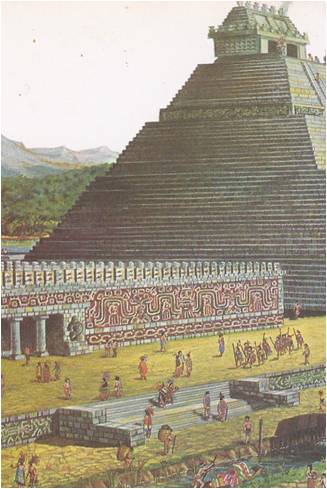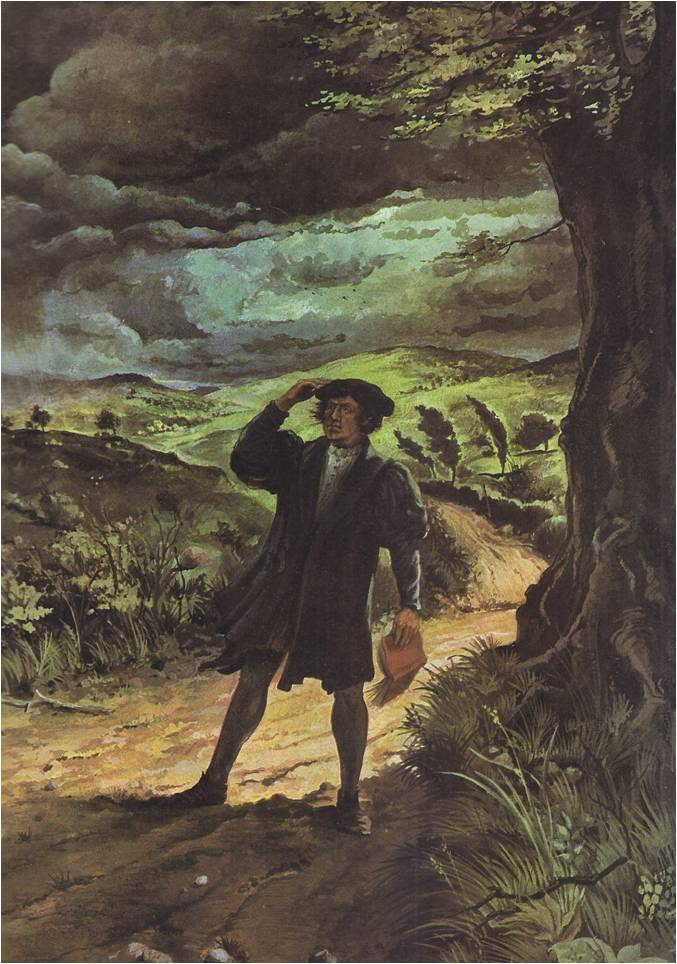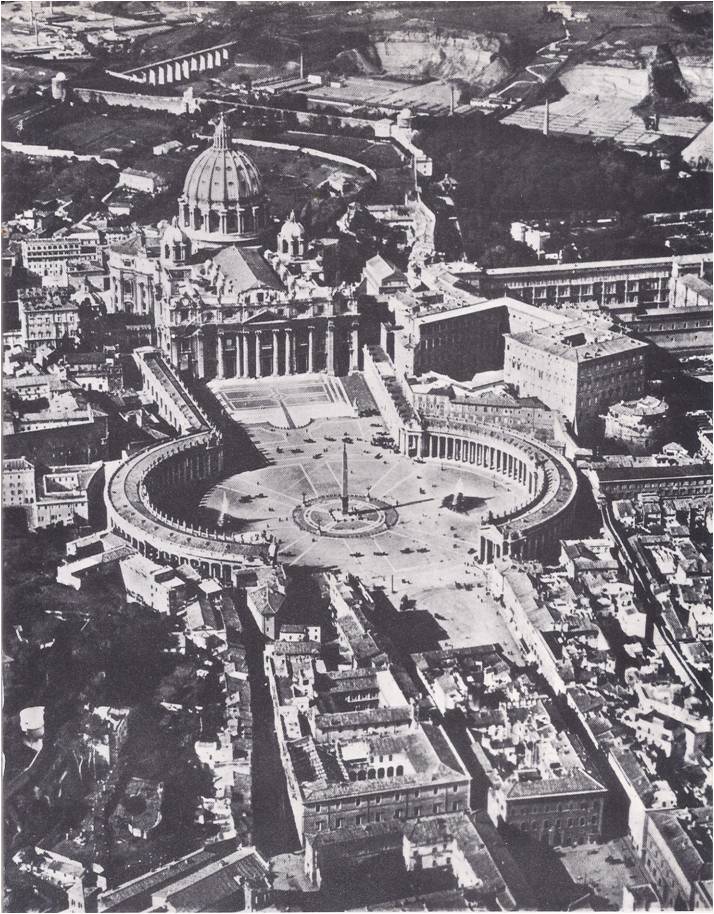EMPEROR MAXIMILIAN I of the Holy Roman Empire walked up to a wild lion and pulled out its tongue; his enemies set his house on fire, tried to poison him and ambushed him twenty times; wild bears attacked him three times, stupid servants ignited powder kegs near him and five boats capsized under him, but always he escaped unharmed. He was a greater general than Julius Caesar, a brilliant musician, scholar and inventor. All these stories were proof that Maximilian was a great hero — but they were written by authors whom Maximilian himself hired to do the job. He supplied some of the plots himself and he made sure the stories were properly heroic. Then he had them illustrated by the finest artists of Europe. In real life, Maximilian was indeed a bold soldier and a fine hunter and he was also a shrewd emperor. He did not have much power and one reason he had tales written about him was to encourage the German princes and dukes to give him more authority. Maximilian’s powers were weak because the Holy Roman Empire — Germany as it was later known — was a freak among European lands. The empire was as wealthy as other lands. It had a great trading league, the Hanse; the wealthiest bankers in Europe, the Fuggers; and more people than any neighbouring land. It even had fierce professional soldiers, the Landsknecht‚ who were feared throughout Europe. The empire was made up of scores of petty governments — principalities, dukedoms, margravates, landgravates and cities — which were united under the emperor only in the loosest way. Even its name was freakish, for the Holy Roman Empire was not particularly holy, it was far from Rome and it was so divided into tiny kingdoms that it was almost …
Read More »Adventures in the New World 1519 – 1620
“I DID NOT come to till the soil like a peasant,” said Hernando Cortez. “I came to find gold.” His words echoed the thoughts of almost every Spaniard in the New World. The discovery of the sea route to the West had set off a great treasure hunt. Colonizing and slaughtering, building and plundering, the gold-hungry Spaniards won a Spanish Empire of the West. Conquistadores‚ they were called — the conquerors. None of the treasure-hunters was more cunning or ambitious than Hernando Cortez‚ who came to the island of Hispaniola in 1504. It was not until 1519 that the governor of Hispaniola sent him on an expedition to explore the coast of Central America. Cortez sailed with five ships, 500 soldiers, eleven cannon and fifteen horses. The fleet anchored near the coast of the territory called Mexico and the men went ashore to build a settlement. Cortez ordered the ships dismantled so that none of his men could go back to Hispaniola, then set off on a march inland. Mexico was a vast country whose Indians had built a highly organized civilization and Cortez had a force of less than 500 men. He was a skillful leader; besides, he had firearms and horses –and good luck. Not long after he began his march, a horde of Indians swept out of the hills to attack the Spaniards. As soon as the Spanish cavalry appeared, the Indians fled to safety. As one soldier later wrote, the Indians, “who had never before seen a horse, thought that steed and rider were one creature.” One tribe after another surrendered. They had been conquered by the people called the Aztecs and many of them offered to join Cortez in the fight to destroy the Aztec empire. As the Spaniards and their Indian allies pushed on …
Read More »Defender of the Faith 1521 – 1603
OF ALL THE RULERS OF EUROPE, none was more eager to please the pope, more anxious to prove himself a loyal son of the Church, than Henry VIII, the handsome young monarch of England. Henry was one of the first to offer his soldiers when the pope formed a Holy League to fight the Turks (and to frighten off the French kings, who had developed the unfortunate habit of invading Italy every few years). Henry never actually sent the troops. To show that he meant well, he wrote a strongly worded book about the duties that men owed the pope and the treachery of Lutherans who dated to question the leader of the Church. “What serpent so villainous,” he wrote, “as he who calls the pope’s authority tyrannous?” It was a most impressive and learned book and no wonder. Much of it was the work of Henry’s scholarly friend Thomas More. When it was published in 1521, the pope rewarded the king by giving him the title “Defender of the Faith.” Henry was delighted with his new title, though not surprised. After all, he was used to being the best at everything he did. He wrote music which the palace musicians insisted was exactly the thing to play at court. He amazed his poets with the excellence of his verses, danced more skillfully than the most light-footed of his courtiers, killed more deer and wild beats than the best of his huntsmen and thought deeper thoughts than the philosophers in his universities — or so his courtiers said. It did not occur to him that people praised him merely because he was the king. Indeed, his one problem was to make use of his many talents when it took so much time to rule his kingdom. He did the best …
Read More »The Counter Reformation 1521-1648
THE BLAST OF MUSKETS and the clang of swords against armour echoed across the plains of Italy, Spain and the Lowlands. Warriors of the king of France were clashing with the Spanish infantry and German knights of the Holy Roman Emperor. Control of the nations of Europe was the prize both nations sought. They schemed and plotted; their generals planned campaigns; their soldiers marched out to victory or defeat. Victories counted for little, for much of Europe’s future was decided by another, different kind of war – a war for the minds and souls of men. Village squares and royal council chambers, churches, university lecture halls and schoolrooms were the battlefields of this new war. Its troops were armies of preachers whose battle-songs were hymns and whose weapons were Bibles and textbooks. Reformers were on the march, Lutherans and Calvinists. Their thundering voices shook the domes of ancient cathedrals and wakened bishops dozing in their palaces. The Reformers won no easy victories‚ however. The forces of the pope were also on the march and the strongholds of the Church were well defended. Frightened by rebellions in Germany and Switzerland, the Catholic leaders in Rome took further measures to strengthen the Church. “There is but one way to silence the Protestants’ complaints‚” a learned churchman told the pope “and that is not to deserve them.” Lowly monks and the powerful cardinals alike began to talk of reform, of hard work, of honesty and godliness. Gradually there were deeds to match the talk — a great Church house-cleaning that one day would be called the Counter-Reformation. Meanwhile, in Europe’s towns and colleges‚ new soldiers of the Church appeared. Their uniforms were the simple black robes of monks, but their minds were as keen as dueling swords — much too sharp and smooth, …
Read More »Preachers of Reform 1518-1564
IN 1518, AN INDULGENCE PEDDLER, a priest from France, made his way through one of the twisting Alpine passes that led into Switzerland. He carried with him a supply of bright banners, an impressive-looking copy of Pope Leo’s Declaration of Indulgences and of course, a collecting box. The French priest’s hopes were high, for the little Swiss merchant towns were rich. He did indeed do well at first and his collecting box began to grow heavy with pieces of gold. Then he came to the town of Zurich. As he began to set up his banners, a town official stopped him. “No indulgences here,” the official said. “I come in the name of Pope Leo and the Holy Church,” the Frenchman replied. “And I,” said the official, “speak for the town council of Zurich and the People’s Priest of our Cathedral who has told us that these indulgences you peddle are no good.” When the Frenchman began to protest, the official said he would have him driven out of town if he didn’t leave peacefully. The Frenchman rolled up his bright banners and went on his way. The Swiss, he knew‚ had always been too independent and now, with this People’s Priest, whoever he was, they seemed to have found another Martin Luther. Actually, nothing so annoyed the People’s Priest of Zurich as being called the “other Luther.” Ulrich Zwingli said that his ideas were his own and that he had come upon them long before Luther began to make a stir in Wittenberg. As a young parish priest‚ fresh from the university, Zwingli had studied Greek and Hebrew in order to read the Bible and other early church writings in their original languages. Three times he had gone to Italy, as chaplain to the rugged Swiss soldiers who were …
Read More »The Monk from Wittenberg 1505-1546
ON A SULTRY JULY DAY IN 1505, a young law student, Martin Luther, was walking along a country road in Germany when a summer storm blew up. The air grew heavy and black clouds filled the sky. Before Luther could take shelter, thunder began to crash. A bolt of lightning struck the road almost at his feet. Thrown to the ground, he lay shaking, not certain whether he was alive or dead. “Help me, Saint Anne,” he cried, “help me and I will become a monk.” After a moment, Luther’s trembling stopped. He stood up, found that he was not hurt and continued his walk toward Erfurt, the town in which he attended the university. He did not forget his promise to Saint Anne. He spent a week or so thinking and making plans. Then he told his professors that he could come no more to their classes. He sold his books, bade farewell to his friends and went to the monastery of the Augustinian friars and said that it was his wish to become a monk. When Martin’s father, old Hans Luther, heard what his son had done, he was puzzled and angry. Hans had worked hard all of his life. Though his ancestors had been peasant farmers, he had managed to set himself up in a little business. But he was far from rich; he had scrimped and saved to send his son to school and to the university. He had long looked forward to the time when Martin would be a lawyer, a man of standing who would make his parents proud and earn the money to care for them in their old age. Now those plans were ruined. As a monk, Martin would never win fame or riches. Hans was furious and he wrote to Martin …
Read More »Rome, the City of the Pope 1492-1564
In 1492, young Giovanni de’ Medici bade farewell to his father, Lorenzo the Magnificent and left Florence to take his place in Rome among the cardinals of the church. At sixteen, Giovanni was a nobleman in the court of the pope, a man of influence and power. That was fortunate, for when Giovanni was eighteen, his family’s power collapsed. The Florentines drove the Medici from their city and Giovanni, who had come home for a visit, narrowly escaped being stoned by the citizens who once had cheered him. As he crept out of the city, disguised as a poor friar, he swore that he would one day return in triumph. First, he thought, he must look to his career in the church. Whatever the Florentines did, he was still a cardinal and in the papal court there were many ways for a clever man to rise to greatness. When he had crossed the Tuscan border, Giovanni threw off his humble disguise, put on the crimson robes and red hat that marked him as a “prince of the church” and took the road that led to Rome. The young cardinal was not alone in hoping to make his fortune in Rome. Indeed, the old city teemed with ambitious men of every sort — scholars and scoundrels, diplomats and spies, millionaires and fortune-hunters, priests and professional murderers. Rome had known every sort of splendour and evil. Memories of unmatched elegance and unbelievable cruelty lingered in the ruins of temples and arenas built by ancient emperors. Grim fortress-houses were reminders of an age of violence, when the bloody feuds of rival clans of nobles had turned Rome into a ghost city. Now there were new mansions, palaces and lofty churches. A new magnificence had come to Rome with the gold that poured into …
Read More »






